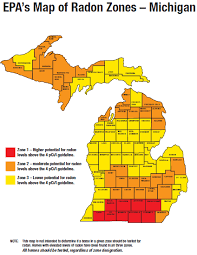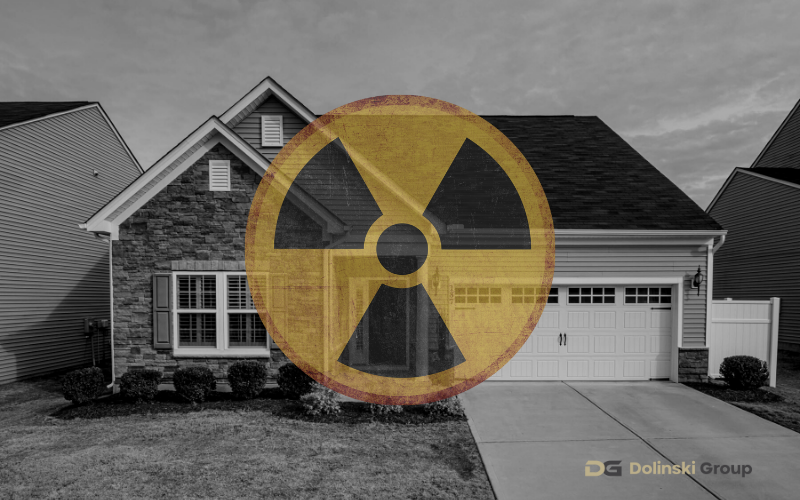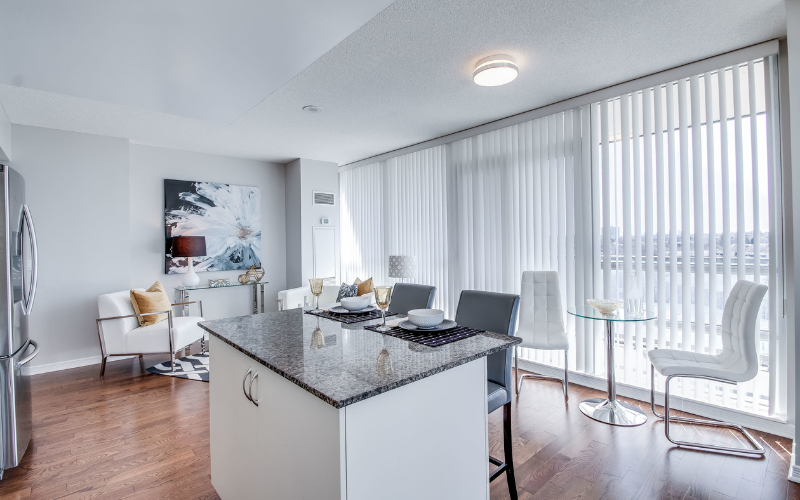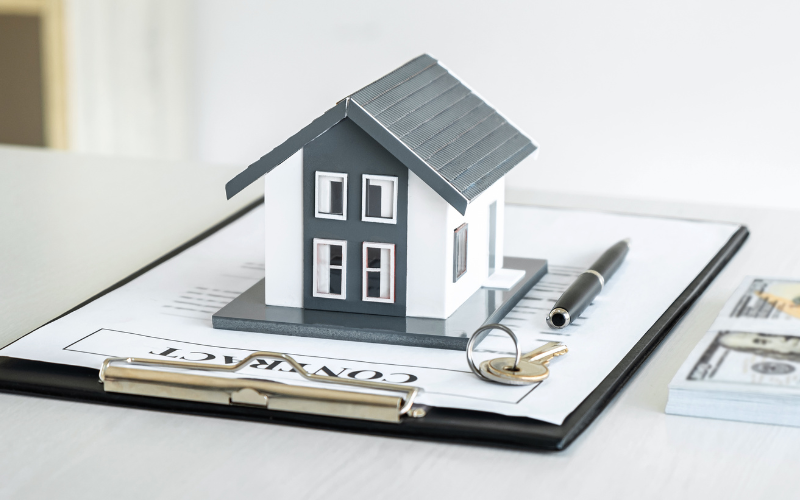Let’s say you want to buy a house with a radon mitigation system. Should you buy it?
My clients often ask me this question after one of the following events. First, they see a big, scary radon mitigation system installed (sometimes mistakes as part of the sump pump system) or, second, their radon inspection results came in above the EPA recommended 4.0 pCi/L level and a mitigation system is recommended to install.
In this article, we’re going to talk about what radon is, the health risk it poses to you and your family, how it will impact your home’s value, and if you should buy a house with a radon mitigation system.
Let’s briefly cover what radon gas is.
What Is Radon Gas?
Radon is a naturally-occurring byproduct of radioactive elements, such as Uranium, decaying. It is an inert, colorless, and odorless gas. Meaning, it goes undetected by human senses.
As elements decay, radon particles are emitted and eventually work their way to the surface and into the environment we live in.
Outdoors, radon disperses rapidly and, therefore, isn’t usually a health concern.
However, radon can easily become trapped indoors. If radon seeps through the foundation’s cracks and holes, high-levels of radon concentration are possible.
For more unbiased information about what radon is, I recommend checking out the resources that the EPA has published.
Why Should I Be Concerned About Radon?
Breathing high-levels of radon over time increases your risk of lung cancer. The second leading cause of lung cancer in the United States is radon. It’s estimated, by the EPA, that 21,000 people die nationally every year from radon-related lung cancer.
Inside of a home, radon can become concentrated in levels that are high enough to put you and your family at potential risk.
The EPA recommends taking steps to mitigate radon, such as with a radon mitigation system, if your home has radon levels of 4.0 pCi/L, or 4.0 picocuries per liter.
Since Radon comes from the ground and is heavier than air, it’s often concentrated in basements and crawl spaces. Your use of your basement can increase your exposure and risk at high levels of radon.
While it’s concentrated in the basement, radon gas still moves through the house due to HVAC systems and the particles ability to travel through cracks in the home.
Luckily, radon has a relatively simple, cost-effective solution. A radon mitigation system and techniques.
Radon Mitigation System: Your Health And Resale Value
What are the effects of having a radon mitigation system?
There are two reasons home buyers ask me if they should buy a home with a radon mitigation system.
First, there is a concern over their health. They want to know that the system works. That they aren’t in any danger or have a risk of being exposed to high levels of radon.
Second, they wonder what effect it will have on the resale value of their home. They don’t want to find themselves stuck in a home that they can’t sell.
Let’s look at both of these concerns to help you determine if you should buy a home with a radon mitigation system.
How Does Radon Mitigation Work?
General advice says that once a radon mitigation system and reduction techniques are in place, home buyers don’t need to worry about their exposure to radon inside their home. You and your family will be safe with a radon mitigation system.
The purpose of a radon mitigation system is to reduce the levels of the gas to below 4.0 pCi/L. Understand that a radon mitigation system may not fully eliminate radon. It will, however, get it to safe levels.
Radon reduction methods involve two methods. They seek to prevent radon from entering a house and by removing existing radon from the home.
With all of that said, whether you should buy a home with a radon mitigation system is up to you, your comfort levels, and your perceived risk of exposure.
For some buyers, they won’t mind. They will feel confident in the radon mitigation system. Other buyers I have worked with in the past, don’t trust the radon mitigation system to do its job.
They believe the system could fail and leave their family exposed to high levels of radon gas. For that reason, they choose not to buy the home with a radon mitigation system.
Hearing words like “radiation” and “cancer” are understandably scary. Some home buyers will not risk their family’s health in a home that had higher levels of radon at one time. I’m usually talking to you, Enneagram Type 6 personalities.
Does A Radon Mitigation System Lower Home Value?
Great question and one that is multi-faceted. Generally, having a radon mitigation system in one’s house does not adversely affect the home’s resale value.
Why? It comes down to comparables and market expectations.
If you’re interested in a home that has a radon mitigation system, odds are that other houses in the area have radon mitigation systems or high-levels of radon in the home.
Radon exposure tends to be concentrated over large geographic areas. Meaning, each home in a specific neighborhood often has the same level of risk exposure to radon.
Here is a map published by the State of Michigan showing risk exposure levels by county. So, for example, homes in Jackson County and Washtenaw County are likely to have radon mitigation systems.

When buyers and the market expects a condition, then no adjustments are made by buyers or sellers.
But, what about if you have the only home in Wayne County with a radon mitigation system? First, this would be rare. Second, an adjustment probably would be made and there would be a minor negative adjustment to the home.
Meaning, it would reduce the home’s value. Again, this would be rare. Either way, ask your agent if radon mitigation systems are common in the area.
If they aren’t, you can still buy the home. The good news is that you can ask less for the home than if it didn’t have a radon mitigation.
So, while you may sell a home for less, you can also buy it for less.
Fewer Home Buyers
For a second, isolate pricing considerations. A radon mitigation system can deter some buyers.
As mentioned previously, some home buyers will not purchase a home with a radon mitigation due to perceived risks. Regardless of how well the radon mitigation system works.
Depending on the market, this could create a shortage of potential buyers for your home. All leading to a longer time on market and lower price.
In a seller’s real estate market, this isn’t likely to be a big deal. Demand for homes is much higher than the supply. Having a shortage of potential buyers isn’t going to be a problem.
On the other hand, a buyer’s market could be a potential issue. The market already has a shortage of buyers and combine that with a radon mitigation system that will deter some buyers, you may have a hard time selling the home.
In general, I wouldn’t worry too much about a radon mitigations system on your ability to sell the home.
You can prevent the negatives when you go to sell by working with a qualified real estate agent so that you purchase the home correctly.
Conclusion
High-levels of radon are a risk to you and your family. Luckily, a radon mitigation system does a great job at keeping you safe. In general, radon mitigation systems won’t reduce the value of a home or make it any harder to sell.
That’s because homes in your area all experience similar radon exposure risks.
If for some reason, you believe it will affect your resale value, then be smart and informed. Purchase the property right so that you can offset any negative outcomes.
Looking for a real estate agent in Wayne County or Monroe? Get in touch with us and see how our guidance can empower you to make smart, informed real estate decisions.




